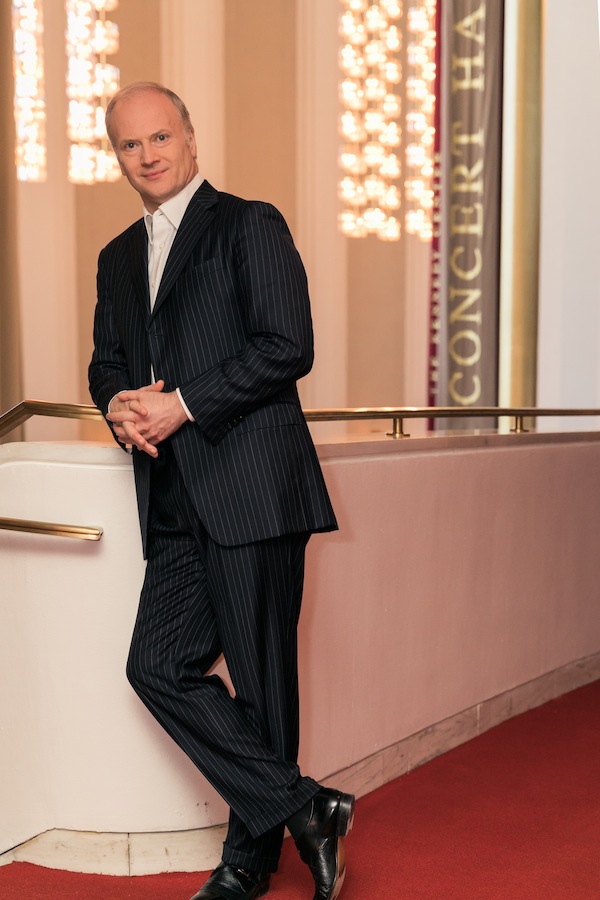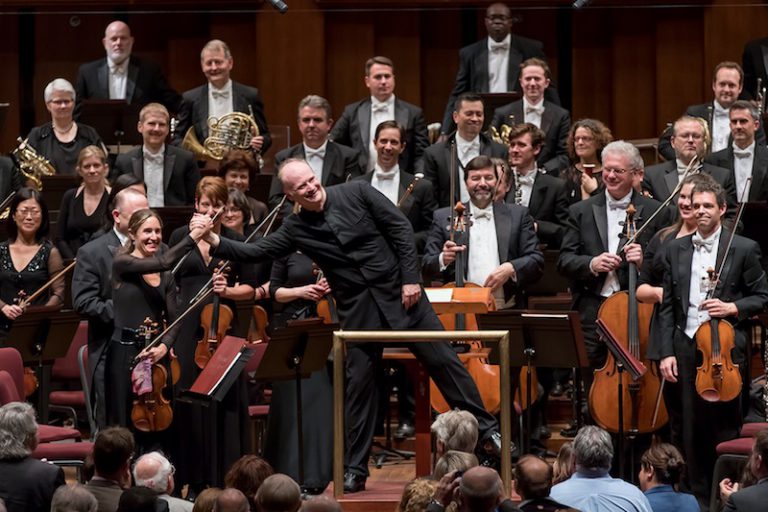Noseda to strive for quality and consistency with National Symphony

Gianandrea Noseda will conduct his first concert as National Symphony Orchestra music director Sunday night. Photo: Tracey Salazar
On Sunday evening Gianandrea Noseda will lead his first concert as the seventh music director of the National Symphony Orchestra. The Italian maestro will conduct the orchestra in eight programs in his inaugural season, the first of four in his initial contract, but he will increase that number to twelve weeks with the orchestra in the future.
A couple days after arriving in town for his first concert, Noseda sat down in the restaurant of a Washington hotel near the Kennedy Center to talk about his plans for the NSO. Tall and impeccably dressed, Noseda showed none of the lofty, distant demeanor of some conductors. Quick to smile, he answered questions graciously in his softly accented English.
“What I found here in the concerts I’ve conducted so far,” Noseda said, sipping an espresso, “was that the orchestra proved to have technical skills and a huge potential.” In the season just past, he led two NSO concerts, one last November and one in January. “And what I also felt is the responsibility to be consistent in the quality, to keep the quality high but also to be consistent, concert after concert. I think we have the possibility to do a good job.”
The question on everyone’s mind is whether Noseda can raise the NSO’s profile, both in the city and in the world at large. The orchestra has never quite been able to pierce the top echelon of American orchestras. “This is always difficult and dangerous,” he warns, not wanting to raise expectations too high. “You know, for me it would be easy to say that this will be one of the greatest orchestras,” he says but quickly shakes his head.
“No,” he insists. “I just want to be consistent and to raise the quality, not only with myself but also with the guest conductors. Even if it is not called the Washington Symphony Orchestra but the National Symphony Orchestra, it is the orchestra of the capital of this great country. To do that name justice, I hope to explore the widest possible repertoire, from the music written before Bach to the most recent music.”
Judging from his appearances last season, Noseda has clearly found sympathetic partners in the musicians of the NSO. At that he nods vigorously. “What I have seen in our meetings so far is that there is an easy way to communicate,” he says with enthusiasm. “They are willing to do what I ask, and I am happy to get something from them. Apparently our way of communication is based on our common love of music.” After a pause, he adds: “There is a sincere love of music. They want to be committed. They are hungry, and this is fantastic. I’m not sure I can fill them, but I am sure I can bring them ideas.”
Among those ideas, he says, is a varied approach to programming. “What I try to achieve is different types of concerts, sometimes concerts with four, five, or six pieces, sometimes a one-piece concert,” he says. “That should stimulate the curiosity of the audience. To do always big chunks with one hour and twenty minutes of music, is too much, or it becomes too predictable.”
He seems to search for a metaphor, finding one in the hotel restaurant where he is being intervewed. “So I am trying to find out how to mix what we present,” he adds. “It is like what you might find in a big hotel breakfast buffet: you present many thing according to different tastes, so that everyone can take what they like. Sometimes they find something new they like, and they change, and that keeps the curiosity alive.”
When asked if he has a free hand to determine the programming, he admits there is a combination of factors, including those in artistic planning who give him advice or offer programs, like the Bernstein anniversary concert he will conduct as the season opener on Sunday. “At the end of the day I have control of the program,” he concludes. “I will not present something I am not convinced of. If I am not convinced how can I convince the orchestra? How can I convince the audience?”
When asked if his choices will be as conservative as they seem this inaugural season, he bristles a bit. Noseda points to pieces like Webern’s Passacaglia, Dallapiccola’s Partita, Adams’ The Gospel According to the Other Mary, and Berio’s setting of Bach’s Contrapunctus XIX from The Art of Fugue, which are featured in the first season.
“Maybe it is not exactly traditional,” he eventually allows, “but it gives a hint of surprise. Let’s say that. I want to give a small taste of what could be..”
“Some of the programs may not be adventurous, but it gives a hint of surprise. You know, you put some spice in a dish, you know, you put some peperoncino, or you put some curry, or you put something unexpected like chocolate — as in a dish I tried recently in Paris.”
He seems aware that the audience in Washington can be conservative, and the programming reflects that. “I want to challenge without shocking,” he adds. “Webern’s Opus 1 [the Passacaglia] is not shocking, but if I don’t put it with [Beethoven’s] Eroica, maybe people will not come.”

File photo: Scott Suchman
Does he feel the responsibility to program neglected American composers in the capital of the United States, beyond Bernstein, Copland, and Gershwin, all on the upcoming season? “Samuel Barber is a composer who is very close to me,” he says, also avowing great admiration for Walter Piston. “I am open to new composers, too. If I find something interesting or good, I take the challenge to learn it and present it. I did it in Manchester with British music. I like to learn new music. Being here in the capital, being under the spotlight in Washington,” he adds, laughing, “it is important.”
What does he think of the efforts of Deborah Rutter, who brought Noseda on early in her tenure as president of the Kennedy Center, to give popular music a more prominent place there? “For me it is important to perform at the highest possible level,” he says. “If I am to do Eroica, I want to do Eroica the best I can. At the same time, if you try to bring pop music it has to be at the highest possible level. I am very open to this. The crucial point is to present good music.”
It is good to take risks and be open to a wide range of music, he adds. “How to attract new people, young people to concerts? That is part of the problem. Whatever you do deserves to be played in the best possible way. To do something with rock music, probably I am not the best person. The same if you asked me, why don’t you do Buxtehude? There are other conductors better equipped to do that, to give a better account of that repertoire.”
As far as other types of outreach to raise the orchestra’s profile, he wants to continue the NSO residencies, to bring the orchestra and its music out into the community. He would like to take the group on tour, as his predecessor did, and is exploring the possibility of a trip to Japan at some point in the future. The NSO would still like to present him conducting at a free concert on the National Mall, and the Bernstein season opener this weekend and other concerts will be broadcast on the Internet by Medici.tv.
Noseda was to have begun his tenure over the summer, with a big concert featuring Orff’s Carmina Burana at Wolf Trap in July, which he had to cancel because of an emergency back surgery. He affirms that his recovery is going very well. “Today I feel much stronger,” he says. “I had to be operated on this summer within 72 hours, for this herniated disc that came out very abruptly. It was pushing on the nerves of my left leg, so that’s why they to had to remove the hernia.”
The healing is not complete, but Noseda feels confident he is on the right track. “I was in very good hands,” he says of his doctors. “I still have to do a lot of physical therapy, so that I regain the strength in my left leg. It will take longer. The doctors have been very clear: if I don’t do the physical therapy, forget it. With physical therapy I can regain 85 to 90% of my strength.”
Is there pain still affecting his ability to lead performances? “Since the operation the back pain has disappeared,” he says. “It is not affecting my work schedule, since I started again on the 18th of August. During the intermissions I have to do stretching, something I have never done before, just to stretch the muscles, and that helps a lot. And since coming back I have already done 17 performances, which is a lot.”
Noseda says he plans to stay in Washington a couple weeks at a time, balancing out his schedule here with ongoing commitments to the London Symphony Orchestra, the Israel Philharmonic, and the Teatro Regio in Turin. “I want to experience the city. You know, maybe you have a Monday off and you go to visit a museum. You walk around the city and find a good wine shop and go to buy some wine.”
What should people expect when he takes the podium?
“We need to break down the idea that to come to a concert hall is like going to a church, to a synagogue or a mosque,” he says with fervor. “I can see it could be frightening to people, because they don’t know how to behave or what to wear, or when to applaud. Just come. If you clap at the wrong time, who cares? You will learn for the next time, or you will not! You will not come back, or you will. You may find something that interested you or impressed you. You will start to think differently about classical music, or about live performance.”
“The most important thing in drawing people to concerts is just to say, Come and hear. Not to explain what is important or why they should like it,” he says with a wry smile. “Come! At least try. What I can guarantee is my full commitment to what I am trying to offer to you. Come and see!”
Gianandrea Noseda leads the National Symphony Orchestra in the gala season opener, a celebration of the Leonard Bernstein centenary, 6 p.m. Sunday in the Kennedy Center Concert Hall. kennedy-center.org; 202-467-4600.


